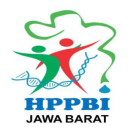Validation Of Learning Aids Protein Synthesis Made From Plastic Waste
DOI:
https://doi.org/10.37150/rebion.v1i2.988Abstract
Background: Learning aids have an important role for teachers and students because they can help students to understand a concept easier, help teachers in the teaching and learning process, motivate students to study harder, and help students to learn more actively. In this instantaneous era, people want something more practical, for example buying drinks with plastic containers (both plastic cups and mineral drink plastic bottles), which causes more plastic waste and has a negative impact on living things and the environment. The objectives of this research was to describe the quality (validation) of learning media for protein synthesis props made from plastic waste as raw material. Method: This study uses a research development (R&D) method. The sample of the research were two experts (validators), namely: 1) biological material expert, and 2) media and teaching expert. The sampling technique used purposive sampling technique. The data collection technique used a questionnaire sheet containing validation of material relevance and validation of media designs. Result: In general, the results of the validation of learning media for protein synthesis props made from plastic waste are at a very valid level, namely the relevance of the material gets 99.66% in the very valid category and the assessment of media design gets 97.5% with a very valid category. Conclusion: This shows that the learning media for protein synthesis teaching aids made from plastic waste is suitable for use in SMA / MA levels.










